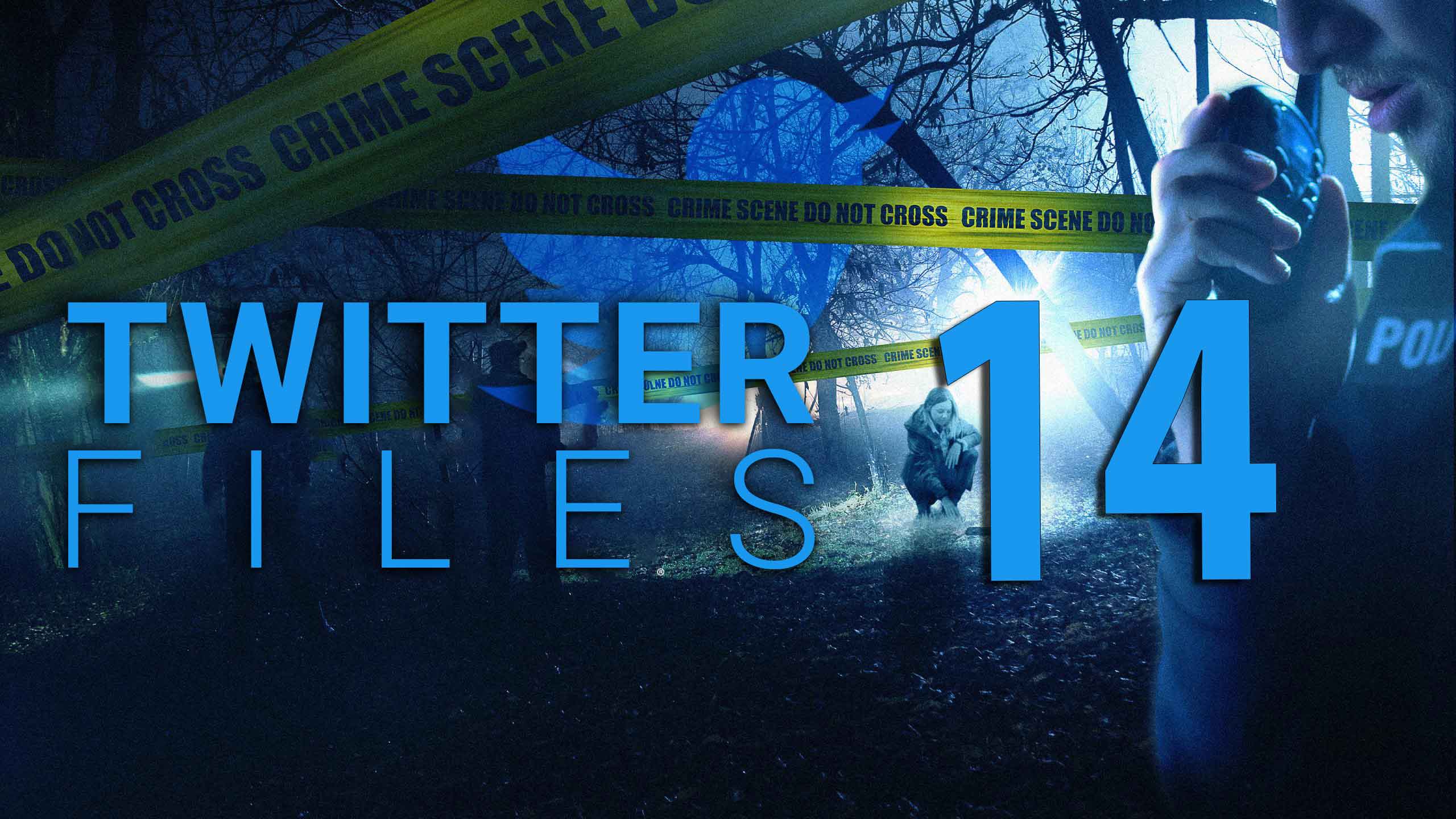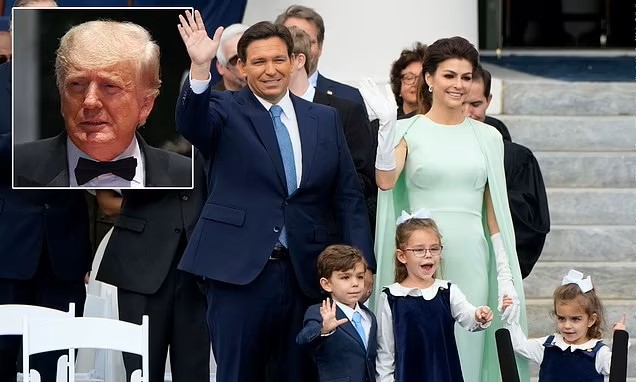The Twitter Files: Part 14 – #ReleaseTheMemo scandal
Growing distrust of mainstream media should be supplemented by scrutiny among users of Big Tech social media. They’re not an answer to the problem.
Twitter files 14: This one was prepared by news veteran Matt Taibbi. From his Substack post: “Remember this one? Russian bots and trolls were blamed by virtually every major news organization in the country for amplifying the hashtag #ReleaseTheMemo. The files contain a mass of emails from executives blowing up this ridiculous story, once and for all. / “The #ReleaseTheMemo scandal was one of the more shameful episodes in the recent history of our media, but taken seriously by all but one or two mainstream editors at the time. All citing the same dubious source — the Hamilton 68 “dashboard” trumpeted by former FBI counterintelligence official and current MSNBC contributor Clint Watts — they insisted Russians deployed Twitter bot-armies to whip up cyber-support for Republican congressman Devin Nunes. Nunes had just released a classified memo alleging Democrats and the FBI used the infamous paid oppositional research dossier of ex-spy Christopher Steele to obtain secret FISA surveillance authority on Trump-connected figures like Carter Page, amid other improprieties. / “We now know Twitter internally found no evidence, as in zero, that Russians were anywhere near this story.”
From TF 14:
The significance of this (and probably other) Russian influence claims is that the mainstream media pros — whose news sense we are all supposed to trust — either did not suspect anything or pretended that they did not. They entirely failed to ask critical questions. That’s why we hear very little about the steady stream of Twitter revelations from them now. The big question is what news institutions that the public can trust will replace them?
Here are capsule summaries of all the Twitter files up to 13 so far, with links and glossary.
There is a danger, if we get caught up in the latest revealing file dump, of failing to see the momentous big picture, which is that Big Tech control of the news, with the tacit support of Big Media and the U.S. federal government, means that we did not get a very good picture of what was happening in the last few years by turning to the internet. Here are three instances to ponder:
● If you relied on legacy mainstream media for coverage of Elon Musk’s Twitter reforms, you probably heard plenty of angst from former employees but you may not have heard about the crackdown on using the platform for child sex abuse:
To those who aren’t aware yet, last week Twitter did add a direct reporting option for child sexual exploitation. (ONLY on tweets with content images/videos) this was not previously available and was a separate form that wasn’t easy to find.
I’m grateful to see these changes. pic.twitter.com/AI88XdX9HW— Eliza (@elizableu) November 20, 2022
It may relevant that Musk has ten kids himself.
● Facebook, eager to please the White House, apparently suppressed true information about the COVID vaccines in order to combat “vaccine hesitancy”: “As you know, in addition to removing vaccine misinformation, we have been focused on reducing the virality of content discouraging vaccines that does not contain actionable information. This is often-true content, which we allow at the post level because it is important for people to be able to discuss both their personal experiences and concerns about the vaccine, but it can be framed as sensation, alarmist, or shocking.” In short, if you thought that Facebook was manipulating your news in order to get compliance, you were right. No wonder 2022 has been dubbed the year conspiracy theory became conspiracy fact. Or as some wags now say, these days the lead time between a conspiracy theory and today’s news is six months.
● Non-compliant media have also been a target. A recent lawsuit by the attorneys-general of Missouri and Louisiana show that the White House was after Facebook to censor Fox News host Tucker Carlson: “Facebook’s efforts did not meet the administration’s demands for greater censorship, however. In response to the representative, White House Director of Digital Strategy Robert Flaherty questioned how Carlson’s video didn’t violate Facebook’s existing policies and pressured the company to turn over information on the efficacy of its censorship practices.
“‘How was this not violative? The second half of the segment is raising conspiracy theories about the government hiding that all vaccines aren’t effective,’ Flaherty claimed. ‘Moreover, you say reduced and demoted. What does that mean? There’s 40,000 shares on the video. Who is seeing it now? How many? How effective is that?’” – The Federalist (January 10, 2023)
For the purpose of creating public trust, there’s nothing like the White House stage managing news in order to protect its political narrative…
At any rate, the current plunge in public trust of legacy mainstream media needs to be supplemented by growing scrutiny among users of Big Tech social media. They’re not an answer to the problem.
You may also wish to read: As the Twitter files drop, ponder the future of mainstream media. Mainstream media are largely ignoring the story for reasons that go to the heart of their own growing weakness and unstoppable decline. Journalism will never matter anywhere near as much to the MSM again as doing what their betters want. And they view those who follow the story as a threat.
and
Big Tech censorship goes well beyond Twitter. Big Tech media is not, in itself, an answer to current legacy mainstream media if we would like to know information that our betters would prefer that we didn’t. Governments that gain control of media generally want an absolute rewrite of history so that it re-emerges as a PR machine for their governance.
Twitter Files: Top Democrats peddled false Russian bots narrative about Nunes memo, despite Twitter warnings
Twitter officials called Adam Schiff and others ‘congressional trolls’ for pushing fake bots narrative about #ReleaseTheMemo hashtag
Twitter Files prove government was ‘in the censorship business in a huge way’: Matt Taibbi
‘Griftopia’ author Matt Taibbi sounds off on ‘Tucker Carlson Tonight’ on what he’s learned through releasing Elon Musk’s Twitter Files.
Journalist Matt Taibbi unveiled part 14 of the Twitter Files on Thursday, diving into the “Russiagate lies” and how he says a “fake tale of Russian bots” helped Democrats denounce the famous Devin Nunes report about flaws in the Trump-Russia investigation.
Emails and memos show that high-powered Democrats peddled a narrative of Russian bots despite being told directly by Twitter that there wasn’t a connection to the Kremlin.
The lengthy Twitter thread began with Taibbi noting that “at a crucial moment in a years-long furor, Democrats denounced a report about flaws in the Trump-Russia investigation, saying it was boosted by Russian ‘bots’ and ‘trolls.'”
He then indicated “Twitter officials were aghast, finding no evidence of Russian influence,” and shared an email in which Twitter executives appeared to inform Rep. Adam Schiff, D-Calif., and Sen. Dianne Feinstein, D-Calif., that the social media platform “has not identified any significant activity connected to Russia with respect to Tweets posting original content to this [#ReleaseTheMemo] hashtag.”
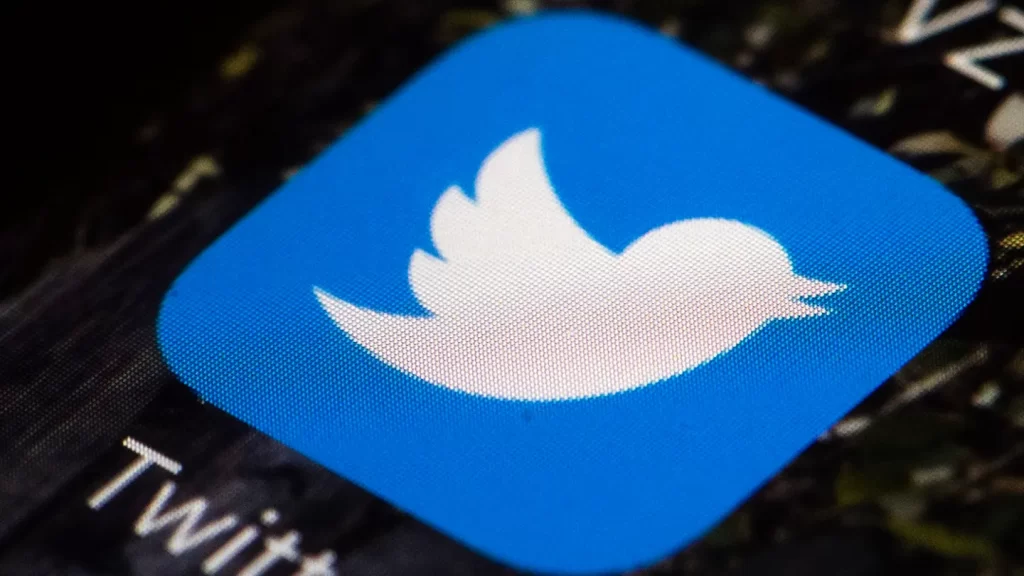
Journalist Matt Taibbi unveiled part 14 of the “Twitter Files” on Thursday. (AP Photo/Matt Rourke, File)
Elon Musk has been vocal about being transparent when it comes to Twitter’s past and present actions curating content on the platform, including censored content. The Twitter owner has enlisted independent journalists to slowly release evidence of these actions in a series dubbed the “Twitter Files” that continue to expose once-secret communications.
“Twitter warned politicians and media they not only lacked evidence, but had evidence the accounts weren’t Russian – and were roundly ignored,” Taibbi wrote. “On January 18th, 2018, Republican Devin Nunes submitted a classified memo to the House Intel Committee detailing abuses by the FBI in obtaining FISA surveillance authority against Trump-connected figures, including the crucial role played by the infamous ‘Steele Dossier.'”
“The Nunes assertions would virtually all be verified in a report by Justice Department Inspector General Michael Horowitz in December 2019,” Taibbi continued. “Nonetheless, national media in January and early February of 2018 denounced the Nunes report in oddly identical language, calling it a ‘joke.'”
Taibbi pointed out that on Jan. 23, 2018, Feinstein and Schiff “published an open letter saying the hashtag ‘gained the immediate attention and assistance of social media accounts linked to Russian influence operations.’”
 “Connecticut Senator Richard Blumenthal followed suit, publishing a letter saying, ‘We find it reprehensible that Russian agents have so eagerly manipulated innocent Americans,’” Taibbi wrote.
“Connecticut Senator Richard Blumenthal followed suit, publishing a letter saying, ‘We find it reprehensible that Russian agents have so eagerly manipulated innocent Americans,’” Taibbi wrote.
“Feinstein, Schiff, Blumenthal, and media members all pointed to the same source: the Hamilton 68 dashboard created by former FBI counterintelligence official Clint Watts, under the auspices of the Alliance for Securing Democracy (ASD),” Taibbi noted; Watts is an MSNBC contributor. But Twitter officials found no authentic Russian connection to the #ReleaseTheMemo hashtag and informed Democrats as such.
“Inside Twitter, executives panned Watts, Hamilton 68, and the Alliance for Securing Democracy. Two key complaints: Hamilton 68 seemed to be everyone’s only source, and no one was checking with Twitter,” Taibbi wrote.
He then noted that then-Twitter exec Emily Horne wrote, “I encourage you to be skeptical of Hamilton 68’s take on this, which as far as I can tell is the only source for these stories… it’s a comms play for ASD.”
Then-Trust and Safety chief Yoel Roth also warned “all the swirl is based on Hamilton,” and other Twitter execs echoed that notion.
Twitter staffers tried to stop Blumenthal from releasing his letter, to no avail.
“Execs eventually grew frustrated over what they saw as a circular process – presented with claims of Russian activity, even when denied, led to more claims,” Taibbi wrote. “They expressed this explicitly to Blumenthal’s camp, saying ‘Twitter spent a lot of resources’ on this request and the reward from Blumenthal shouldn’t be round after round of requests.”

“Despite universal internal conviction that there were no Russians in the story, Twitter went on to follow a slavish pattern of not challenging Russia claims on the record,” Taibbi wrote. “As a result, reporters from the AP to Politico to NBC to Rolling Stone continued to hammer the ‘Russian bots’ theme, despite a total lack of evidence.”
Taibbi then shared a series of headlines in which media outlets pushed the Russian bots narrative.
Twitter also discovered no Kremlin source for other hashtags that mainstream and liberal media outlets blamed on sinister Russian activity.
“NBC, Politico, AP, Times, Business Insider, and other media outlets who played up the ‘Russian bots’ story – even Rolling Stone – all declined to comment for this story,” Taibbi wrote.
But media organizations aren’t the only ones refusing to speak with Taibbi.
“The staffs of Feinstein, Schiff, and Blumenthal also declined comment,” Taibbi wrote.

Asked for comment, Nunes told Taibbi that the “Russia collusion hoax” was one of the “greatest outbreaks of mass delusion in U.S. history.”
“The Russiagate scandal was built on the craven dishonesty of politicians and reporters, who for years ignored the absence of data to fictional scare headlines,” Taibbi wrote. “Twitter had no editorial input on this story. Searches were carried out by third parties, so the documents could be limited.”
This marked the 14th installment of the Twitter Files, which began going viral last month shared by prominent independent journalists including Taibbi, Bari Weiss, Michael Shallenberger, Lee Fang and David Zweig.
Previous Twitter Files have covered a wide range of topics, including the company’s suppression of the Hunter Biden laptop story during the 2020 presidential election; the internal pressure it faces to permanently ban former President Donald Trump; efforts by the White House and government officials to suppress content; and the existence of shadow-banning of prominent conservatives.
Fox News’ Joseph A. Wulfsohn and David Rutz contributed to this report.
Democrats and media organizations knowingly propagated
the ‘Russiagate theory’ hoax to discredit Donald Trump’s election victory: Twitter Files

The story was covered in detail by journalist Matt Taibbi who emphasised that Twitter employees found no evidence of Russian influence in the 2016 US elections, yet they continued to allow Democrats and media organisations to use their platform to push the notion that Trump had Moscow’s backing.
On Thursday (January 12), the 14th tranche of the ‘Twitter Files’ was released on the social media platform, which exposed how the Democratic Party leaders and the mainstream media organisations used the ‘Russiagate theory’ to discredit the 2016 victory of the former US President Donald Trump.
The story was covered in detail by journalist Matt Taibbi who emphasised that Twitter employees found no evidence of Russian influence in the 2016 US elections, yet they continued to allow Democrats and media organisations to use their platform to push the notion that Trump had Moscow’s backing. “Twitter warned politicians and media they not only lacked evidence but had evidence the accounts weren’t Russian – and were roundly ignored,” he pointed out.
Former US House of Representative, Devin Nunes, had submitted a classified memo to the House Intel Committee on January 18th, 2018, pointing out several flaws in the Russiagate conspiracy theory.
Although the report was verified by the US Justice Department a year later in December 2019, the Democrats went all-out to cast aspersions on the memo presented by Devin Nunes.
The sceptics included Democratic leaders Senator Dianne Feinstein, Congressman Adam Schiff, Senator Richard Blumenthal and leftist propaganda outlets such as MSNBC, The Washington Post and others.
Interestingly, Democrats and their lap-dog media had unilaterally relied on an online dashboard called ‘Hamilton 68’, published by a national security advocacy group ‘Alliance for Securing Democracy’ to further their claims. The dashboard claimed to expose Twitter activity related to the supposed ‘Russian disinformation campaign.’
However, internal communications now show that Twitter employees (who are mostly Democratic Party supporters) had failed to gather any evidence that could lend credence to the Russiagate conspiracy theory.
Yoel Roth, former Global Head of Trust & Safety at Twitter, pointed out, “I just reviewed the accounts that posted the first 50 tweets with release the memo (hashtag) and…none of them show any signs of affiliation to Russia.”
‘Twitter Files 14.0’ revealed how attempts made by top executives to stop Democrats from posting unverified claims about Russiagate were in vain.
“It might be worth nudging Blumenthal’s staffer that it could be in his boss’ best interest not to go out there because it could come back to make him look silly,” emphasised one concerned Twitter employee about the political well-being of Democrat Senator Richard Blumenthal.
“Executives eventually grew frustrated over what they saw as a circular process – presented with claims of Russian activity, even when denied, led to more claims,” wrote journalist Matt Taibbi.
It became clear that Democrats went ahead with their outlandish claims about the ‘bogus’ Russian disinformation campaign, despite warnings from top Twitter employees.
Later, it dawned upon the Twitter employees that they were being exploited by the Democratic Party leader. “Blumenthal isn’t looking for real and nuanced solutions,” noted one executive.
“Despite universal internal conviction that there were no Russians in the story, Twitter went on to follow a slavish pattern of not challenging Russia claims on the record,” noted journalist Matt Taibbi.
“…Reporters from the AP to Politico to NBC to Rolling Stone continued to hammer the “Russian bots” theme, despite a total lack of evidence,” the author of ‘Twitter Files 14.0’ added.
Matt Taibbi said, “Russians weren’t just blamed for #ReleaseTheMemo but #SchumerShutdown, #ParklandShooting, even #GunControlNow – to “widen the divide,” according to the New York Times.”
Interestingly, the above-mentioned news outlets and Democratic Party leaders who peddled the Russiagate conspiracy theory refused to speak to Matt Taibbi.
While speaking about the matter, ex-US House of Representative member Devin Nunes said, “Schiff and the Democrats falsely claimed Russians were behind the Release the Memo hashtag, all my investigative work.”
“This #ReleaseTheMemo episode is just one of many in the #TwitterFiles. The Russiagate scandal was built on the craven dishonesty of politicians and reporters, who for years ignored the absence of data to fictional scare headlines,” journalist Matt Taibbi concluded.
Democrats peddled debunked ‘bot’ conspiracy to denounce memo exposing ‘abuses’ in the Trump-Russia investigation – even though Twitter told them there was NO EVIDENCE of Moscow’s involvement, new files reveal
- 14th Twitter Files installment dives into spread of discredited Russia theory
- Centers on 2018 memo from Devin Nunes on flaws of Trump-Russia links
- Democrats said the memo was being promoted on Twitter by ‘Russian bots’
- But Twitter executives found no evidence Moscow was behind the push
- It warned the Democrats, but they kept publicly pushing the false claims
- The social media company failed to issue a public statement on their findings
Democrats peddled false narratives that Russian bots were promoting a memo about the Trump-Russia investigation – even though Twitter told them they had found no evidence of Moscow’s involvement, according to a new installment of the Twitter Files.
The 14th installment of the social media company’s files released by journalist Matt Taibbi showed executives tried to warn senior Democrats about a debunked ‘Russian bot’ theory in 2018.
The Democrats claimed Devin Nunes’s 2018 memo, which exposed flaws in the investigation linking Donald Trump to Russia before the 2016 election, was being amplified by Kremlin-backed entities on social media.
Twitter employees said the claims weren’t true and shared their findings with the Democrats, but their efforts were in vain because politicians kept pushing the theory anyway.
Instead of publicly challenging the claims, Twitter was instead told by outside counsel to issue a vague statement saying they take bots and foreign interference ‘seriously’, Taibbi writes.
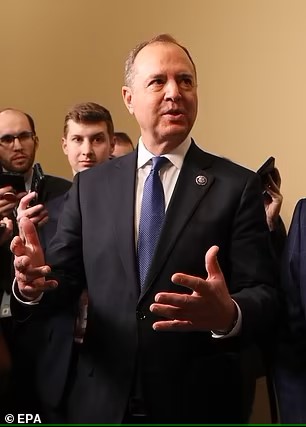
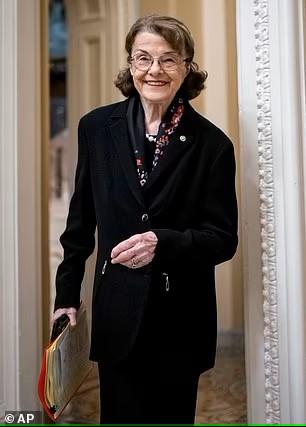
Twitter stood by and let Democrats peddle false narratives about ‘Russiagate’ – even though they found no evidence of Moscow’s involvement, according to a new dump of files from the social media company. Rep. Adam Schiff (left) and Senator Dianne Feinstein (right) pushed false claims that Russia was behind a campaign
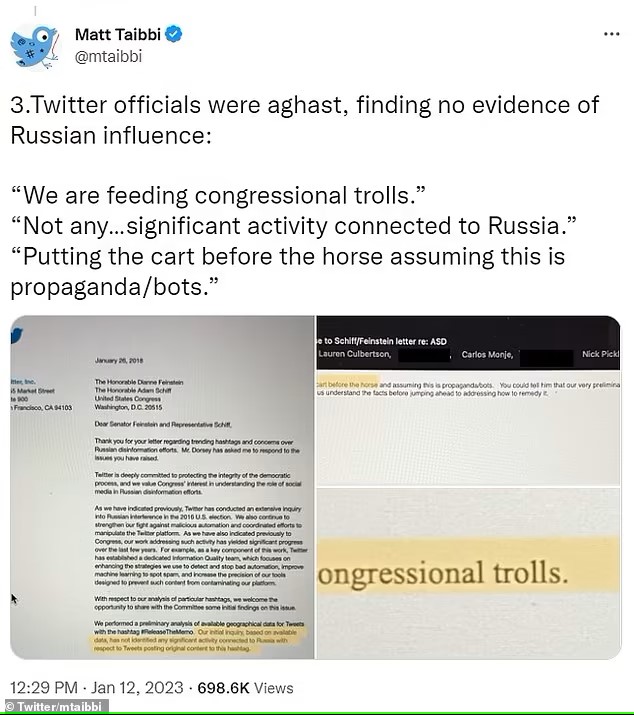
- The 14th installment of the Twitter Files released by journalist Matt Taibbi showed executives tried to warn senior Democrats about a debunked ‘Russian bot’ theory in 2018
It is further evidence of how Russiagate theories and the discredited Steele Dossier were able to be publicized with little challenge.
‘Twitter warned politicians and media they not only lacked evidence but had evidence the accounts weren’t Russian – and were roundly ignored’, Taibbi wrote.
In 2018, Democrats discredited the Republican memo on FBI surveillance abuse by falsely suggesting it was being promoted by ‘Russian bots’ with the hashtag ReleaseTheMemo.
The memo, written by former Chair of the House Intelligence Committee Devin Nunes, pointed out flaws in the investigation into Trump’s supposed links to Moscow.
Nunes’s memo was verified by the Department of Justice a year later.
California Democrats Sen. Dianne Feinstein and Rep. Adam Schiff wrote an open letter saying the ReleaseTheMemo hashtag was being promoted by ‘Russian influence operations’.
And Sen. Richard Blumenthal (D-Connecticut) then said it was ‘reprehensible that Russian agents have so eagerly manipulated innocent Americans’.
Taibbi wrote that: ‘Feinstein, Schiff, Blumenthal, and media members all pointed to the same source: the Hamilton 68 dashboard created by former FBI counterintelligence official Clint Watts, under the auspices of the Alliance for Securing Democracy.’
The dashboard claimed to expose Twitter activity connected to any ‘Russian disinformation campaign’.
Twitter’s Global Policy Communications Chief Emily Horne, who went on to work at the White House and National Security Council, told her colleagues to be ‘skeptical’ of the Hamilton 68 dashboard and said it was a ‘comms play’ for the Alliance for Securing Democracy.
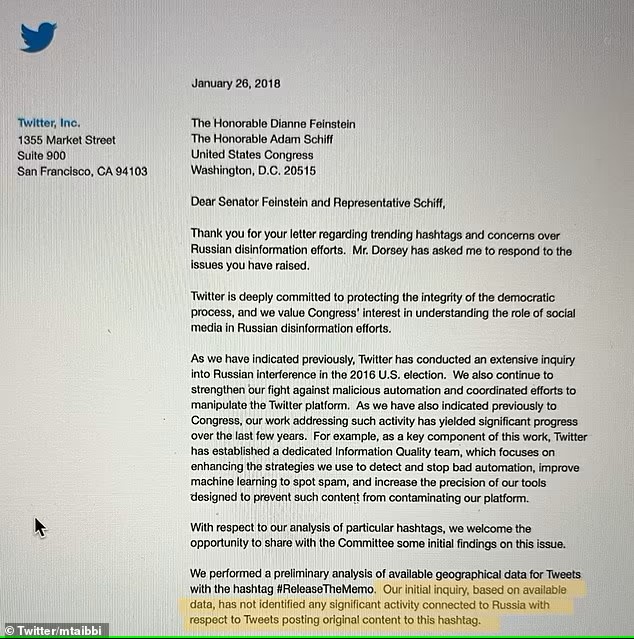
Twitter executives wrote to Feinstein and Schiff saying they had found no evidence of Russian activity connected to the Release The Memo hashtag
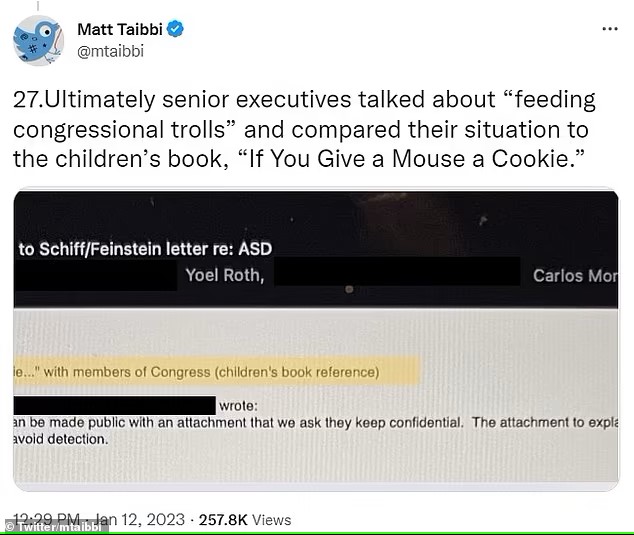
Twitter execs responded internally by saying: ‘We are feeding congressional trolls’ and compared the situation to the story: ‘If You Give a Mouse a Cookie’
Their own internal investigations on the ‘bot’ theory had found ‘not any… significant activity connected to Russia’.
Ex-trust and safety chief Yoel Roth, who resigned over his role in censoring the Hunter Biden laptop story, also couldn’t find any Russian connection to the bid to discredit the memo.
‘I just reviewed the accounts that posted the first 50 tweets with #releasethememo,’ Roth wrote according to Taibbi. ‘None of them show any signs of affiliation to Russia’.
Twitter reached out to Senator Blumenthal’s office to explain that bots were not responsible, but they were ignored.
Staffers even tried to offer the Democrat other information that could be seen as ‘wins’ for him.
‘It might be worth nudging Blumenthal’s staffer that it could be in his boss’ best interest not to go out there because it could come back to make him look silly,’ one Twitter staffer wrote.
But Blumenthal went ahead and published the false claims anyway, and Twitter executives grew ‘frustrated’ with the fact their work was being swept under the rug.
Their efforts to try and combat the claims waned, and they didn’t release statements on the record saying the ‘bot’ theory was false.
News outlets continued to push the false narrative.
Twitter execs responded internally by saying: ‘We are feeding congressional trolls’.
They also said Democrats were putting the ‘cart before the horse’ by assuming the social media campaign was started by Russia.
Twitter senior executives compared the situation to the story: ‘If You Give a Mouse a Cookie’.
‘He’ll want a glass of milk, which will lead to a wave of other exhausting requests, at the end of which he’ll want a glass of milk. And one more cookie’, Taibbi wrote.
On the bombshell claims, Nunes told Taibbi: ‘Schiff and the Democrats falsely claimed Russians were behind the Release the Memo hashtag, all my investigative work.
‘By spreading the Russia collusion hoax, they instigated one of the greatest outbreaks of mass delusion in U.S. history.’
Taibbi concluded: ‘This #ReleaseTheMemo episode is just one of many in the #TwitterFiles. The Russiagate scandal was built on the craven dishonesty of politicians and reporters, who for years ignored the absence of data to fictional scare headlines’.
Twitter Files part 14 sheds light on “Russian bots” and #ReleaseTheMemo
It began in 2018 when Senators Dianne Feinstein and Adam Schiff wrote the platform a letter regarding trending hashtags and Russian disinformation campaigns. Twitter pointed out that both the politicians and the media didn’t only lack the evidence but had evidence the accounts were not Russian. However, the platform was “roundly ignored.”
Backtracking to a week before Twitter received the letter, Republican Devin Nunes submitted a classified memo to the House Intel Committee that detailed the abuses by the FBI in obtaining Foreign Intelligence Surveillance Act (FISA) surveillance authority against those connected to former President Trump. Included was the role played by the Steele Dossier.

Credit: Matt Taibbi
In December 2019, a report by Justice Department Inspector General Michael Horowitz verified Nunes’ assertions virtually.
“We also found that the FBI’s interviews of Steele, his Primary Sub-Source, a second sub-source, and other investigative activity revealed potentially serious problems with Steele’s descriptions of information in his reports,” the report read. “Among other things, regarding the allegations attributed to Person 1, the Primary Sub-source’s account of these communications, if true, was not consistent with and, in fact, contradicted the allegations of a “well-developed conspiracy” in Reports 95 and 102 attributed to Person 1.”
The report also pointed out that the FBI filed three renewal applications with the FISC in 2017, repeating the seven “significant errors contained in the first FISA application.” Yet, the report found another ten errors in the three renewal applications. Taibbi noted that despite that, the national media denounced Nunes’ report in January and February 2018 in “oddly identical language, calling it a ‘joke.’
Senators Feinstein and Schiff also wrote an open letter claiming that the hashtag “gained the immediate attention and assistance of social media accounts linked to Russian influence operations.
The senators claimed that Nunes’ memo “distorts” classified information. “But note they didn’t call it incorrect,” Taibbi wrote.
Connecticut Senator Richard Blumenthal also wrote a letter. “We find it reprehensible that Russian agents have so eagerly manipulated innocent Americans citizens and undermined our democratic processes through our elections and public policy debates.”
The letter asked Twitter to notify users who interacted with tweets created by the accounts tracked by the Alliance for Securing Democracy (ASD). The senators and members of the media pointed to the Hamilton 68 dashboard created by Clint Watts, a former FBI counterintelligence official, created The letter asked Twitter to notify users who interacted with tweets created by the accounts tracked by the Alliance for Securing Democracy.”
The Hamilton 68 dashboard was described as a project with the Alliance for Securing Democracy at the German Marshal Fund and tracked around 600 accounts that it claimed were tied to Russian-sponsored influence and disinformation campaigns. Bret Schafer, an analyst who helped run the project, spoke about the #ReleaseTheMemo hashtag.
“I’ve never seen any single hashtag that has had this amount of activity behind it,” he said. Taibbi noted that the dashboard “was vague in how it reached its conclusions.”
Twitter executives didn’t quite trust the dashboard and the key complaints were that Hamilton 68 seemed to be the only source of information and no one was checking with Twitter. Global Policy Communications Chief Emily Horne encouraged skepticism of the dashboard’s take. In the screenshots below, Horne pointed out that it was a comms play for ASD.
“They’ve made a very strong media push in the last week, piggybacking on Clint’s testimony.”
Off the record, she said, “I encourage you to be skeptical of Hamilton 68’s take on this, which, as best as I can tell, is the only source for these stories. 1) Hamilton 68 does not release the accounts that make up their dashboard, so no one can verify the accounts they include are, in fact, Russian automated accounts, and 2) it is extraordinarily difficult for outside researchers, who do not have access to our full API and internal account signals, to say with any degree of certainty that an account they believe is behaving suspiciously is 1) automated and 2) Russian.”
“If you speak with them, I encourage you to press them on how they can be sure of both of these claims when they do not have access to internal signals and data.”

Twitter’s former head of safety, Yoel Roth, wasn’t able to find any Russian connection to the hashtag and noted that after reviewing accounts that posted the first 50 tweets with the hashtag, none showed any signs or affiliation to Russia. Instead, Twitter found that the engagement was “overwhelmingly organing and driven by strong VIT engagement). VIT is an acronym for very important Tweeters, and these included Wikileaks, Donald Trump Jr., and Congressman Steve King.
When Twitter brought this up to a Blumenthal staffer, the staffer tried to wave them off “because we don’t believe these are bots.”

Another Twitter executive pointed out that if Blumenthal would lay off on this, “it seems like there are other wins we could offer him.” However, the senator published his letter, which led to the platform’s executives being frustrated over what they viewed as a circular process.
“Twitter spent a lot of resources to respond to the initial request, and the reward from Blumental shouldn’t be round after round of requests for user notice. It also doesn’t do anything to fix the problem. That distracts our team from the real iq fight.”
Twitter executives later realized that they were”feeding congressional trolls” and compared the requests to a popular children’s book, If You Give a Mouse a Cookie.

Although Twitter believed that there were no Russians in the story, it stopped challenging Russia’s claims on the record. Outside counsel from firms advised Twitter to use language such as “With respect to particular hashtags, we take seriously any activity that may represent an abuse of our platform.”
This resulted in reports from several mainstream media outlets pushing the “Russian bots” story without any evidence. Taibbi noted that several media outlets that played up the “Russian bots” story declined to comment. So did the staff for Senators Feinstein, Schiff, and Blumenthal. Nunes shared a comment.
“Schiff and the Democrats falsely claimed Russians were behind the Release the Memo hashtag, all my investigative work… By spreading the Russia collusion hoax, they instigated one of the greatest outbreaks of mass delusion in U.S. history.”

